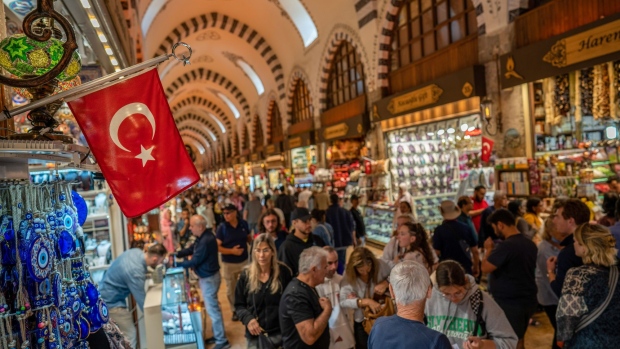Nov 3, 2022
Turkish Inflation Tops 85% In Likely Peak for This Year
, Bloomberg News

(Bloomberg) -- Turkish annual inflation accelerated for the 17th month in a row in October, driven by a surge in food prices and energy costs, to its likely peak during President Recep Tayyip Erdogan’s two decades in power.
Consumer prices rose an annual 85.5% through last month, official data on Thursday showed, slightly lower than the median forecast in a Bloomberg survey. Monthly inflation was 3.54%.
Policy makers have blamed the inflation on high commodity costs, partly caused by Russia’s invasion of Ukraine. What’s less acknowledged is the impact of Erdogan’s unorthodox economic policies that reject raising interest rates to curb inflation.
Economists think prices may cool down in the remaining months of the year because of the base effect, referring to the sharp price surges toward the end of last year.
The currency shock of last year, combined with monetary policy, had translated to deterioration of pricing expectations, Cem Cakmakli, an assistant professor of economics at Istanbul’s Koc University, said.
While monthly inflation toward the end of 2021 was in double-digits, it’s in single digits this year, prompting estimates for year-end inflation to fall to around 70%, he added.
“If there is a movement in the currency, it’ll affect pricing behavior that has already deteriorated, so we may not be able to speak of the base effect,” he said.
What Bloomberg Economics Says...
“Inflation is likely to decelerate in the coming months due to base effects -- we see the year-end rate at 75%. The level will remain elevated as the Turkish central bank’s ongoing rate easing cycle continues to weaken the lira and feed into rising prices. The bank’s previous easing cycle -- cutting rates by 500 bps at the end of 2021 -- played into a lira crisis and inflation rates north of 80%. This time, both the lira’s resilience and the inflation outlook will face a greater challenge, with the central bank’s loose monetary policy also accompanied by expansionary fiscal policy as the country gears up for elections next year.”
--Selva Bahar Baziki, economist. Click here for more.
Consumer and producer price jumps have also significantly diverged. Factory gate prices were up 157.7% last month from a year earlier, driven higher by energy costs. Cakmakli said the spread was common in other countries, as rallying energy prices drove up production costs. In Turkey, the gap may also indicate that factory prices have not beenpassed on to consumers yet, he said.
Erdogan claims -- contrary to textbook economics -- that high borrowing costs will result in high inflation. He has introduced a so-called New Economy Model, prioritizing growth through increasing exports and investments, and creating new jobs.
Under pressure from the president who is seeking single-digit numbers by the end of this year, the central bank delivered consecutive rate cuts, last reducing the benchmark to 10.5%.
The economic thinking has yet to show results. Official inflation is currently 17 times higher than the central bank’s target. Meanwhile, in Istanbul, Turkey’s most populous and affluent city, annual retail inflation soared to 109% last month.
The easing cycle has taken its toll on the lira, which is down by more than 28% against the dollar this year. The bank has signaled that it will most likely deliver another cut in November.
In place of higher rates, the central bank has relied on a series of measures aimed at the banking sector to micromanage loan growth and propel the wider use of the lira.
Erdogan has said inflation will fall early next year, ahead of elections in June where he’s seeking another presidential term. He’s promised Turks the government would remedy the burden of higher living costs that the opposition has blamed him for.
“They are constantly bringing up inflation, we will talk about it after New Year’s,” Erdogan said in a televised interview on Wednesday.
--With assistance from Harumi Ichikura.
(Updates with new analyst comment in third, fourth, eleventh paragraphs)
©2022 Bloomberg L.P.





